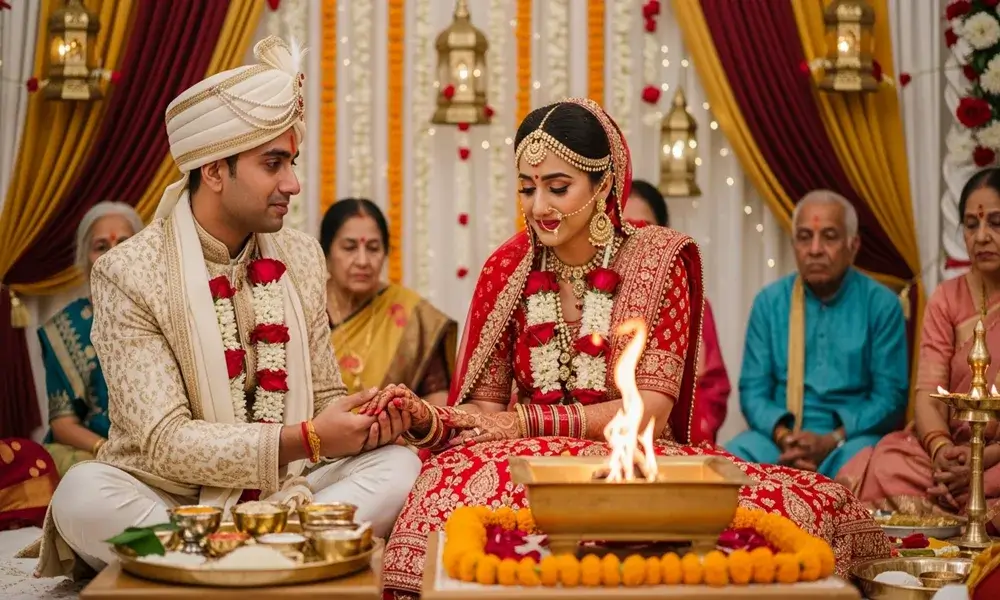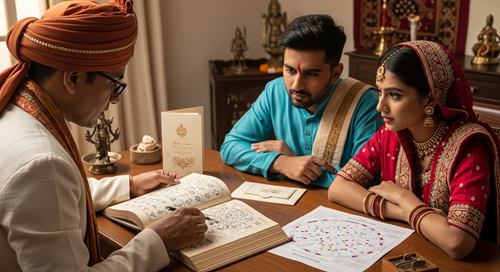Role of Vedic Astrology in Indian Marriages
Discover how Vedic astrology in Indian marriages through horoscope matching, kundli analysis, and compatibility checks for lifelong harmony
Author -Babita Saini

Marriage is one of the most important decisions in life. In India, over 80% of families still consider astrology before finalizing a match. Nearly 65% of young couples consult astrologers to understand compatibility and future harmony. Vedic astrology is an ancient Indian system to find out the energetic connection that is essential for a relationship. Vedic astrology provides information about potential compatibility, harmony, challenges, and long-term stability for the couple.
Vedic Astrology
Vedic Astrology, known in Sanskrit as Jyotish, is a 5000-year-old horoscope traditional system of astrology from India. The term Vedic comes from “Vedas,” which is the oldest sacred text of Hinduism. The term "Jyotish" means "science of light," referring to the light of the celestial bodies, and its purpose is to illuminate the path of an individual's life.
The Vedic astrology system is based on the belief that the movements and positions of planets and stars at the time of a person's birth influence their life, personality, and destiny. It calculates planetary positions based on their actual location relative to fixed stars, a difference that has led to a noticeable shift between the two systems over time.
Benefits of Using Vedic Astrology in Marriage
| Aspect | Astrological Help |
| Compatibility | Horoscope matching and guna analysis |
| Stability | Remedies for doshas and negative placements |
| Timing | Guidance on the right age and Muhurat |
| Relationship Harmony | Study of planets linked to love, respect, and trust |
Why Marriage and Astrology Are Connected
Astrology and marriage have been connected in Indian culture for hundreds of years due to the belief that planetary positions at the time of birth affect a person’s nature, health, and relationships. Since marriage is not just an emotional bond between two people but also a social and family responsibility, people often take astrological help to reduce risks and ensure long-term stability.
Vedic Astrology Helps in Marriage
Vedic astrology offers a systematic approach to understanding the complexities of marriage. It helps couples to understand their compatibility, timing, harmony, challenges, and long-term stability.
1. Kundali Matching (Horoscope Matching)/ Compatibility Analysis
The most common way Vedic astrology is used for marriage is through the Kundali Matching. In this method, the birth charts of the couple are compared to check their compatibility. This is also known as Ashtakoota Milan. It calculates eight specific aspects of their relationship, each carrying a certain number of points up to a total of 36. A higher point total generally signifies greater compatibility in married life.
Here are the eight points of Ashtakoota Milan:
| Point | Name | Focus | Max Points |
| 1 | Varna | Spiritual alignment, ego | 1 |
| 2 | Vashya | Mutual attraction, influence | 2 |
| 3 | Tara | Destiny, well-being, fortune | 3 |
| 4 | Yoni | Physical intimacy, passion | 4 |
| 5 | Graha Maitri | Mental and intellectual harmony | 5 |
| 6 | Gana | Temperament, nature, behavior | 6 |
| 7 | Rashi | Emotional connection, love | 7 |
| 8 | Nadi | Health, genetics, progeny, longevity | 8 |
2. Manglik Dosha Analysis
Manglik Dosha, also known as Mangal Dosha, important factor that is considered before finalizing a marriage. It occurs when Mars (Mangal) is placed in certain houses of the birth chart, usually the 1st, 2nd, 4th, 7th, 8th, or 12th house. Astrologers believe that this placement can create difficulties in married life, such as delays in marriage, conflicts, or a lack of harmony between partners. With the help of astrologers Mangal Dosha effect can be reduced through remedies like rituals, fasting, or wearing gemstones, or even nullified when matched with another Manglik partner.

3. Compatibility Beyond Gunas
While Ashtakoota Milan, which focuses on "Gunas," is a standard process in Vedic astrology. But Vedic astrology is not just about scoring high guna points; it is also about the placement of planets in the 7th house, the role of Venus, Mars, and Jupiter, and the balance of both charts. Mental connection, emotional understanding, and lifestyle alignment are equally important. Even if the Guna score is high, a detailed analysis helps in identifying areas where challenges may arise, giving couples a clearer picture of their long-term compatibility.
4. Timing of Marriage
Timing, also known as Muhurta, is a crucial element for the long-term stability of a couple. Astrologers analyse the position of Venus (the planet of love and relationships) and Jupiter (the planet of wisdom and guidance) to see which time/muhurta is favorable for a couple.
Another important factor in Vedic astrology is the dasha, antardasha (planetary periods), and Nakshatras (lunar constellations), which tell whether marriage is likely to occur early, on time, or later in life.
5. Remedies for Problems
Vedic astrology suggests different remedies when challenges appear in a marriage or while searching for a suitable match. These remedies are aimed at reducing the negative influence of certain planetary positions and bringing stability in relationships. Some common practices include: Gemstones, Mantras, Pujas or rituals, fasting, vows, Lifestyle Adjustments, Charity, and Donations
Vedic Astrology does not guarantee a perfect and happy marriage. But a Vedic Astrologer provides guidance that reduces doubts, challenges, and risks for the couple, through Kundli, planetary, and dosha analysis
Also Read:
Recent Blogs
Palm Reading Marriage Line That Interpret Divorce and Separation
Best Sleeping Direction as per Vastu with 7 Sleeping Tips
7 Reasons Why You Should Wear Firoza Stone for Benefits
7 Benefits of Neelam Stone in Vedic Astrology
11 Lucky Plants for Home and Office That Bring Good Fortune
7 Ways to Remove Negative Energy from Home, Body and Mind